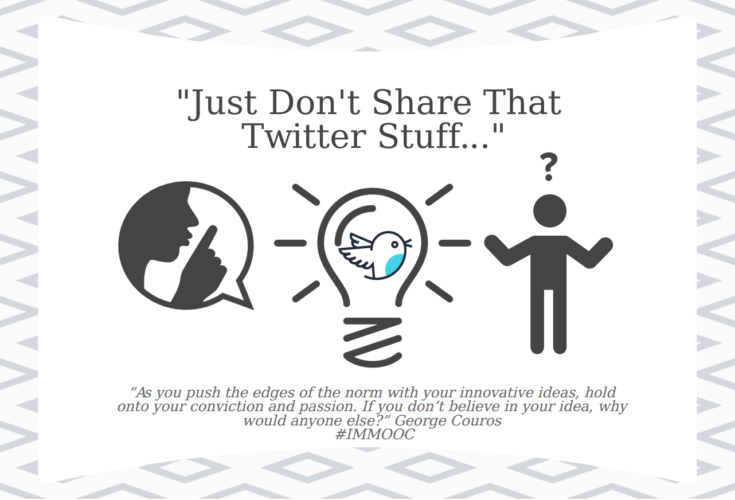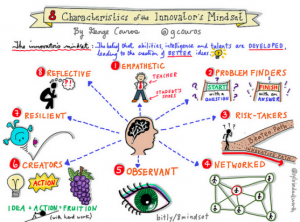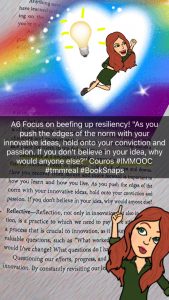Tara,
I suspect that one element of this advice is about how most people react to public speaking or public writing. Remember, the single greatest fear in adult Americans is public speaking…ahead of spiders, heights, and death. And many adults don’t like to write. So many people I suspect think of Tweeting with fear: it’s public and it’s writing. So I suspect that many people saying to not worry about tweeting or discussing tweeting are somehow channeling their own fears….This is all easy to forget when you are immersed in the blogosphere…
So true, John. Thanks for sharing.
I just can’t wait to read your book someday and #BookSnap it. And I’ll post your wise words all over Twitter.
YOU ROCK, Michael. Hopefully, that will be at the end of this year *fingers crossed*, and it’s great to know I’ll have at least one reader. Heart you! PLN-buds-for-life!
Tara! Way to go! Your passion is contagious! I am excited to follow your administrative journey with you. I can’t imagine not talking about “that Twitter stuff” it has definitely made an impact on me as an educator and ITF.
Thank you, Kristin. You’re too kind. I’m thrilled to learn and grow from YOU as a connected educator!
Hi Tara,
First of all, congratulations on your appointment; well done indeed. Thanks for this post in which you make a number of observations which are doubtless interesting to most folks, but especially so for me. I’m conducting doctoral research into teachers’ use of Twitter in support of their professional learning. Hope you don’t mind me asking a couple of questions?
You mentioned ‘risk taking’ a couple of times; were you risk *averse* prior to Twitter, or did it just extend your (prior) willingness to take risks? How did it do that?
A second one if I may? Do you think that you (and the 1000s of other educators on Twitter) have particular *traits* that made you amenable to giving it a shot eight months ago, and subsequently make such a personal success out of participating?
Would be really grateful for your insights.
Thanks.
Ian, thanks for your comments.
To answer your first question, no. I was not averse to taking risks before becoming a connected educator. However, by being connected, I developed a new meaning of what ‘risk-taking’ might look like. As I gained new knowledge, read more educational books recommended by my PLN, met the authors of these mind-blowing works and actually saw what educators and students were doing around the globe via GHO or Skype, ‘risk taking’ gained a whole new dimension for me. Before, the system constraints would squelch my ideas, but now it’s as if my mind sees no limits. Now, I think, “How do we make that happen?” “How might I engage my PLN for help?” “In what ways are educators around the solving this?”
As for your second question, the only trait I believe one needs to join Twitter is an open mind and willingness to try something new. Once connected, one will find ‘like-minded’ educators. That is the beauty of building your PLN! You decide with whom to collaborate. It’s like your professional Pandora, because it’s based on your interests, your philosophy, and your professional growth needs. Granted, I enjoy adding individuals to my PLN that think differently than me, as well. It stretches me to see other points of view and helps shape me into a better educator.
Hope that helps.
Thanks so much for your response Tara; I really appreciate you finding the time and providing such valuable feedback. If I could just ask one more thing?
You’ve echoed the views of a number of other people who have similarly sought balance between connecting with like-minded colleagues, and yet being challenged with different views. That provides a degree of tension I suspect? Would it be fair to say we like *some* challenge, but would be understandably resistant if it attempted to fundamentally shift our worldview? So I guess I’m asking, how do we find the balance between finding our ‘tribe'(?), and exposing ourselves to sufficient dissonance to enable us to learn?
Thanks
Excellent post, Tara! I enjoyed reading your insights about the interview process. We must include this in Edgy Educators! So proud to work with you!
Thank you, Jerri. I’d love to share! Can’t wait for the filming of Edgy Educators this month. I love learning from you and Anna.
“…I created a solution to the problem called #BookSnaps ,” That is a great idea and I will try that! Great post Tara and very strong points. I was told and you probably read it many times, people who don’t understand the Twitter stuff, they always going to put it down or trash it. Great post and interesting journey!
Thank you, Gilles. I agree. In fact, I didn’t understand the effectiveness of Twitter until last summer. I had an account but had never actually used it; I think I had less than five followers until June 2016. That’s when I began to realize the power of connected collaboration with educators around the globe.
Oh, and can’t wait to see your #BookSnaps! If you have any questions, let me know. 🙂
I am sharing this with teachers!! I’m going to add my own… I began IMPORTANT discussions around how we as teachers perceive our students because I found a book recommendation Twitter #ForWhiteFolks. I interacted with the author and we bounced ideas on how to facilitate sensitive discussions. I found BOOKSNAPS and excited teachers which then excited teachers! I could stop there but like you, my list is long and impactful, not only for me but for those around me!! Sometimes I get comments about being on a twitter but I stand by my connected PLN!!!
Of course, Amanda. Please do. I wish others could see that it’s more than another social media hang-out, it’s learning and growing with every click. Honestly, I don’t know what I’d do without my PLN. They are my peeps, and they challenge my thinking. I LOVE that I don’t have to wait until the next conference to be inspired; EDU-Awesomeness floods my tweetdeck, daily.
Thank you for sharing your story! I treasure the connections I’ve made and new things I’ve learned via my Twitter PLN. Congrats on the job offer! I can easily see why someone would want you on their team.
Thank you, Susan. I seriously don’t know how I thrived in education without my PLN! I’m grateful we are connected. Keep changing the world!
As someone who is almost finished with their admin, I really enjoyed reading this! I will be in this position of preparing for interviews in the not-so-distant future, and I was able to take a lot out of your blog. I have been connected for about 5 months now, started a blog, am moderating a Twitter chat next week… and it has completely changed me professionally. Thanks for posting this, and good luck in your new endeavor!
Thank you, Joe, for your kind words. My only advice is to be YOU. The REAL YOU! It’s truly what everyone wants, and it’s what we do best. That interview felt like a two-way street–the WHOLE time. It was as if I was interviewing them, too. More importantly, it was as if we were collaborating and sharing ideas. Being connected has helped me gain confidence while challenging me to think differently. Through weekly PD aka Twitter chats, I’ve been able to keep current educational practices at the forefront of my mind, which made this whole process much more fluent.
This is a wonderful post, Tara. I am so happy to have the opportunity to learn from you and with you. Our growth is propelled as we contribute to others. Thank you for contributing to my journey!
Thank you, Steve. I’m grateful to learn and grow from YOU, too! Love your statement, “Our growth is propelled as we contribute to others.” Honestly, I couldn’t agree more.



 At the conclusion of the interview, I opened my heart with a few statements, “Do we want to be good? Or, do we want to be great? I believe if we want to be great we must tap into students’ passions, their strengths. We must help them develop an innovator’s mindset. Why? The future ahead of us is full of uncertainties, but there is one thing of which I feel sure. Smart machines will quickly take the place of “making the grade” and “meeting the standards.” However, I firmly believe robotic devices will NOT be able to replicate the individual passions of every student, every educator, and every human. I can’t imagine that ever being the case. So, how might we prepare students for the future? But more than that, how might we prepare them for right now? We must help them develop an innovator’s mindset, and I’m eager to actively take action to add passion-led learning back into our school system. I realize we need balance, but I want students to not only learn but LOVE learning.”
At the conclusion of the interview, I opened my heart with a few statements, “Do we want to be good? Or, do we want to be great? I believe if we want to be great we must tap into students’ passions, their strengths. We must help them develop an innovator’s mindset. Why? The future ahead of us is full of uncertainties, but there is one thing of which I feel sure. Smart machines will quickly take the place of “making the grade” and “meeting the standards.” However, I firmly believe robotic devices will NOT be able to replicate the individual passions of every student, every educator, and every human. I can’t imagine that ever being the case. So, how might we prepare students for the future? But more than that, how might we prepare them for right now? We must help them develop an innovator’s mindset, and I’m eager to actively take action to add passion-led learning back into our school system. I realize we need balance, but I want students to not only learn but LOVE learning.”